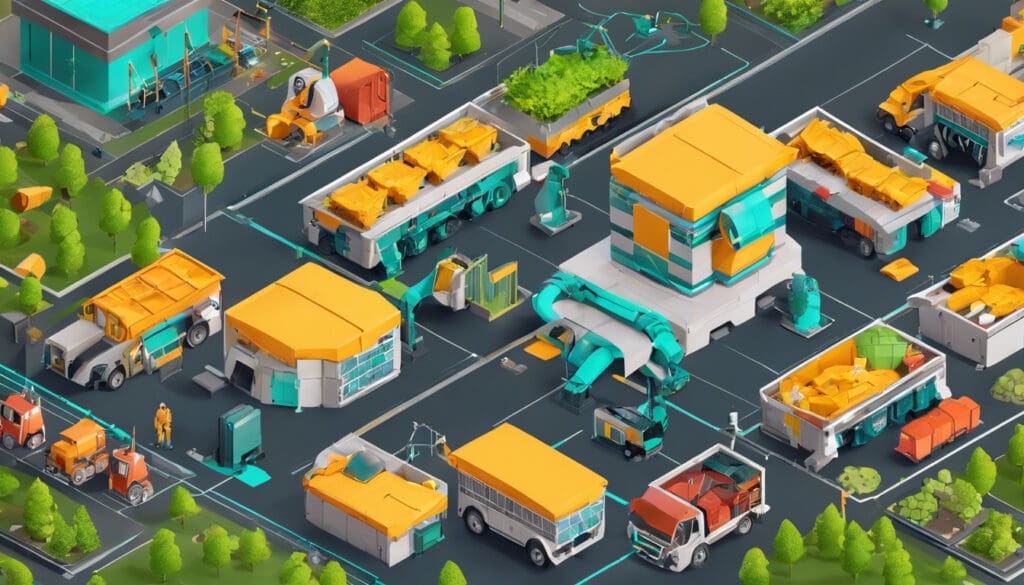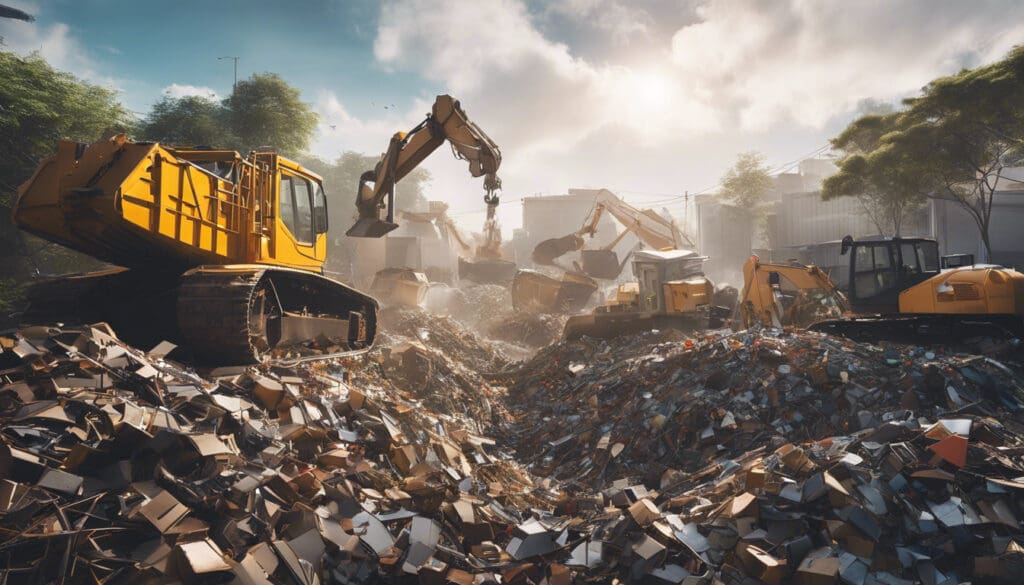The Ultimate Guide to AI Waste Management
Feeling overwhelmed by all the talk about our planet being buried in trash? Imagine a world where technology doesn’t just make life easier but also helps clean our environment. A recent study shows that using artificial intelligence in managing waste could slash landfill waste by up to 30%. Now, that’s something to get excited about!
In this post, we dive deep into how AI, a form of sustainable tech, is changing how we handle waste. From sorting recyclables better to finding smarter ways to collect trash, AI leads the charge in making our planet greener. Discover how these aren’t just ideas for the future but are happening now to create a cleaner Earth.
Want to know how you can be part of this shift or bring it to your neighborhood? Keep reading to learn more.
In the article
Understanding AI Waste Management
What is AI Waste Management?
AI Waste Management uses artificial intelligence (AI) to better manage waste. This means collecting, sorting, recycling, and getting rid of trash more cleverly. AI sorts and handles waste far better than we’ve done before, using algorithms and machine learning.
At its heart, this method aims not just to be more efficient but also significantly help the environment. Innovations, like AI in sorting trash, are crucial for a greener world.
By optimizing recycling with AI, we can lower the chance of recyclables getting contaminated. This big step forward helps keep our planet clean.
How AI is Changing Waste Management
AI is revolutionizing waste management by introducing smarter strategies. This includes using robots and AI to sort and recycle waste more accurately.
Moreover, AI helps design better routes for collecting trash, which cuts down on fuel use and CO2 emissions. Using AI in waste management marks a big move toward sustainability and better efficiency.
Besides automating tasks, AI helps gather important data about waste trends, allowing for smarter decisions about keeping our environment clean.

The Role of AI in Sustainable Technology
AI’s Help in Greening the Planet
AI’s role in green tech is increasingly critical. Through deep data analysis, AI helps cities and businesses manage waste efficiently, reducing harm to the planet.
Automating the collection and sorting of waste, AI enables better recycling, reducing how much trash goes to landfills. This is crucial for improving our environment.
AI Waste Management is key to reaching sustainability goals, helping to limit greenhouse gas emissions, and promoting a recycle-reuse mindset.
Examples of AI in Green Waste Practices
One example of AI in action is robots in sorting centers separating recyclables accurately from trash. These robots sort waste faster and more precisely than people can.
Another example includes AI designing smarter routes for trash trucks, which saves fuel and cuts down on pollution. These instances show how AI is making waste handling greener and more efficient.
The Impact of AI on Waste Management
Boosting Recycling with AI
Adding AI to recycling has hugely improved the process. Machines now sort waste more neatly, upping the quality of recyclables and boosting recycling rates.
This not only makes recycling centers work better but also boosts their profits, which is good news for both the industry and our planet.
Reducing Trash with AI
With smart sorting and predicting, AI Waste Management greatly reduces landfill trash. By correctly recycling materials, less waste ends up in landfills. This move to more eco-friendly disposal methods is vital for a sustainable future.
Case Studies: AI Waste Success Stories
AI Waste Management projects around the world have shown great results. In some cities, AI has made waste pickup more efficient, saving money and reducing pollution.
Another case saw AI robots in recycling centers increase the precision and efficiency of sorting recyclables.
These success stories underline the positive impact AI has on waste management.

Challenges and Solutions in AI Waste Management
Getting Past Technical Issues
Using AI in waste management does face challenges like needing high-quality data and fitting AI systems into current setups.
Yet, with ongoing tech advances and more research, we’re finding solutions. This includes making smarter AI algorithms and better sensors for identifying and sorting waste.
Handling Privacy and Ethical Issues with AI
Privacy and ethics also come into play with AI in waste management. Keeping data safe and using AI responsibly to build public trust is crucial.
To tackle these issues, we must set firm data protection rules and ethical standards for using AI, making sure it positively helps society.
Future Prospects of AI in Waste Management
The Big Promise of AI for the Environment
AI has huge potential to help our planet. As AI tech improves and becomes more common, its influence on waste management and environmental care will only grow.
The future looks bright, with AI expected to play a big role in achieving global green goals through smart solutions like AI in sorting and recycling.
What’s Next in AI and Waste Handling
Looking ahead, we see more advanced AI for sorting waste, drones monitoring trash, and AI managing dangerous waste.
These developments signal an exciting future for AI in waste management, promising more efficient and eco-friendly ways to handle trash.

Wrapping It Up
Now you see how adding artificial intelligence into waste management can do wonders for the environment. This approach not only makes handling waste smoother but also pushes us towards more sustainable living. You’ve got the info you need to consider this innovative solution.
It’s your move. Think about how you or your community can join in and kickstart discussions or initiatives for smarter, AI-powered waste handling. Spreading the word can inspire action, bringing us closer to a greener, cleaner world. Every little step helps in our shared goal of protecting the environment.







